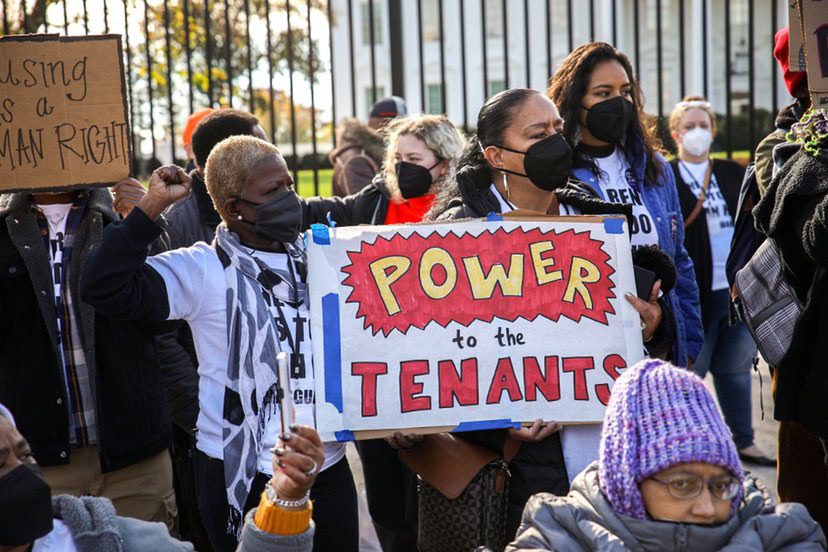
Tenants who have experienced evictions rally at the White House in November 2022, two days after tenant advocates met with White House officials. Photo by Shedrick Pelt, courtesy of People’s Action
The Biden administration’s announcement on renters rights on Jan. 25 was a strange mix of radical and nothingburger.
On the one hand, outside of a few very important but narrowly focused laws like the Fair Housing Act, the federal government has up until now not seen broad tenant protections as within its sphere of action at all. Anything to do with eviction policies, habitability and codes, or regulating rent increases has been left to states and localities. Someone asked me right after the announcement if I knew how long it had been since a president addressed on tenant rights—they guessed the 1970s. Having recently edited a history of the National Tenants Union in the 1970s and ’80s, that era was fresh in my mind and I knew that despite active tenant organizing, federal action at the time was not pro-tenant, so I went back further and guessed the New Deal. But the New Deal was really focused on homeowners and creating public housing. I haven’t actually been able to find anything comparable in our history about renter rights and protections at all.
In that way, this is a really big deal. By taking it on at all, by making even a theoretical Blueprint for a Renters Bill of Rights, the Biden administration is acknowledging that this is something that the federal government has a legitimate interest in, power to act on, and responsibility to take seriously.
A year ago or so, we hosted a chat about security deposit policy in the U.K. Even more than the details of their policy, I remember that everyone in the office was mind-blown by the idea of a federal government that has a tenant policy. One where even Boris Johnson had to at least make a nod to wanting to support tenants somehow.
And so, the Biden announcement feels like it could be the beginning of a tremendous sea change. The administration has declared that the leases of today are a problem (we agree). It is engaging the Federal Trade Commission and the Consumer Financial Protection Bureau against the abuses of tenant screening companies, which could lead to real improvements in tenants’ lives if a crackdown occurs.
But most notable to me was the willingness to even state the phrase “egregious rent increases” as something FHFA and the GSEs might consider taking action against in the properties whose mortgages they back. (They back about half of the mortgages on the market, though not all those properties involve rentals.) Just saying out loud that some rent increases are too big might seem basic, but in our property-rights-worshipping society, it’s an important fundamental point to be established. Obviously, merely studying the issue is a long way from doing anything about it—but you can’t fix what you can’t admit is a problem.
On the nothingburger side, of course, the actual promises and proposals are still largely about studying and information gathering. Where there are a direct plans for action they primarily affect housing under the direct purview of federal agencies, not in the private market where most tenants live, or the action suggested is to provide very modest support, such as education about existing rights, to tenants within utterly broken systems. Stating that there is a right to organize without actually providing good-cause eviction protection is empty. We all know that promising to study and convene can be a politic way of looking good without making meaningful change.
As many folks have pointed out, the Blueprint contains no proposal for a federal good-cause eviction policy, no commitment to actually prevent those “egregious rent increases,” no promise to investigate the bad actors already violating local laws in multiple states at a time. The accompanying “Resident-Centered Housing Challenge” is a transparently flimsy excuse to give cookies to large landlords and their associations for the tiniest of actions (we promise to make sure our tenants know what their limited rights are, and not violate them . . . mostly!) and make it look like a cooperative affair, when those same groups were lobbying hard against anything more concrete.
Given that tenants in crisis can’t put their evictions and rent increases on hold for years while federal agencies study and build political will, the frustration with what they didn’t do is thoroughly justified.
I hope we will all take a moment, though, to give ample credit and thanks to the tenant leaders and organizers and housing advocates who have been fighting consistently for a long time to get the federal government to stake out a position on this topic at all, even as they privately believed the wins were going to remain at the local level for some time to come. They collectively made this happen. (Shoutout also to ProPublica, whose reporting on rent-setting algorithms must be one of the forces behind the recommendation in the administration’s announcement for the U.S. Department of Justice to look into just such practices.)
There’s plenty more work to do, but the folks who got us this far are planting trees in whose shade they may never sit, and whose fruit they may never eat. This sapling will need serious protection and watering if it’s going to grow into something with branches that can bear weight. But it is, in fact, a win.




The Biden Blueprint proposes a 30-day notice period before an owner can evict a nonpaying tenant. Many states now have much shorter quit-or-pay laws – often three or five days. Of course a 30 day period would help a stressed renter who must make plans to move, say because of a job loss that makes their rent unaffordable.
But there will be unintended consequences for such a proposal. A recent study we did in Wisconsin showed that only 2.6% of money judgments from evictions filed in 2015 had been paid 5 years later. In a high percentage of eviction cases the owners don’t even bother going back to court to get unpaid rent damages after securing an eviction writ because such judgments are uncollectible.
A 30-day notice requirement will (1) increase asking rents because of greater expected losses from evictions, (2) have owners requiring double security deposits and (3) result in tighter screening practices. And consider that these three practices are going to hurt the “good” tenants – who have never been evicted – when they next apply for new housing.
Thanks Miriam,
I was in the “nothing burger” camp but I now realize that calling out egregious rent increases is significant.
Pat Morrissy
I was shocked to learn recently that landlords have all the power when it comes to lead testing, too. A tenant can contact a remediation authority to do testing, but even if they do find something, it is up to the landlord to sign off on remediation and many will not due to the expenses. This leaves families, particularly those with children, in a very precarious position, because it can impact the lives of their kids and their ability to learn and be productive.